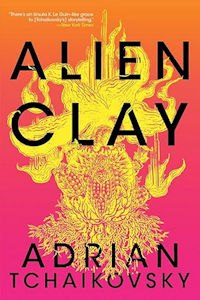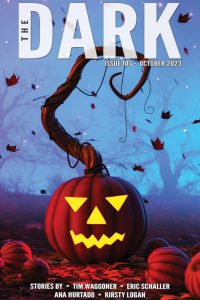Paul Di Filippo Reviews Alien Clay by Adrian Tchaikovsky
 Alien Clay, Adrian Tchaikovsky (Orbit 978-0316578974, trade paperback, 432pp, $19.99) September 2024
Alien Clay, Adrian Tchaikovsky (Orbit 978-0316578974, trade paperback, 432pp, $19.99) September 2024
If Michael Bishop and Tom Disch had collaborated to script an episode of the Aliens franchise, and then the result had been filmed by Toho Studios, the result might have well come to resemble Adrian Tchaikovsky’s newest kick in the pants, Alien Clay. This is one of three great books Tchaikovsky has released in 2024; similar runs of brilliance in the field are few and far between. Maybe Robert Silverberg or John Varley (in the short-story arena) or Michael Moorcock or Robert Reed or Charles Stross had similar batting averages in such a compact timeframe, but other instances are hard to cite. If this fellow continues to pump out such high-caliber tales so frequently, the rest of us slowpoke scribes might just as well fold our tents and creep away.
The book is narrated in the first-person by a scientist named Arton Daghdev, and his immaculately unique voice—witty, self-pitying, cynical, hopeful, resigned, ambitious, fearful, brave, and above all allusive—is one of the seductive hooks that grab the reader—not that there is any absence of alluring and scary stefnal wonders to also draw one in compulsively.
At a medium distance in the future, the Earth is ruled by an authoritarian government called the Mandate. There are frequent mini-rebellions against the dictatorship, but they always fail. And what happens to the captured rebels? Exiled en masse to a harsh labor camp on the planet of Imno 27g (otherwise known as Kiln). Arton is one such, a professor whose antifa playacting went a bit too far.
Obviously, this motif puts the novel in the good company of space jail books such as Tom Godwin’s Space Prison and George Zebrowski’s Brute Orbits. (Heinlein certainly initiated the idea of future prison exile with his short tale “Coventry”.) But there’s a lot more going on than mere penal system condemnation.
We open with the harrowing orbital smashdown of the pods containing Arton and his fellows. Then comes a quick introduction to the camp Commander, a half-reasonable, half-sadistic guy named Terolan; to the other prisoners; and to the cadre system of workers. Lucky folks get to stay inside the hermetically sealed base. Unlucky ones are in the Excursion Squad, and must go out into the native Kiln biosphere with the shabbiest of protection. Why unlucky? The manifold creatures of Kiln, from microbes to mammoths, are all deadly to humans. Proof of that resides in some caged specimens of infected humans that Terolan keeps on exhibit: warped, teratological monstrosities.
At first Arton’s exobiological expertise is deemed usable in camp, to help solve the mystery of the native Kiln artifacts. These are the only traces of nonhuman intelligent life ever found, and the Mandate is eager to incorporate any aliens into its worldview. But pretty soon, the prisoners are staging a revolt, hoping to capture a ship in orbit and escape. Arton participates. The riot is swiftly put down, and Arton, as punishment, is now part of the Excursionists.
This sequence occupies roughly the first third of the novel. The remaining portion brings Arton face to face with the deadly wildlife of Kiln, the machinations of his fellows, and a shattering revelation about the ultra-weird biology of the planet. Tchaikovsky has imagined a truly different para-evolutionary history and schema for Kiln life and its interactions with humanity. He doles out the secrets bit by bit, via a series of highly dramatic life-and-death encounters. Particularly harrowing—yet transcendent—is a forced trek through the “jungles” of Kiln after Arton and his party lose their transport. The whole shebang culminates in an inversion of hierarchies—and major trouble for the Mandate and Earth.
Seeking to explicate my Bishop-Disch-Aliens trope, I’ll cite Bishop’s “Death and Designation Among the Asadi” as relevant to the alien artifact mystery. Disch’s Camp Concentration invokes the prisoner-as-guinea-pig motif. And the body horror is down to Ridley Scott. And I might even toss in George Alec Effinger’s The Wolves of Memory and Silverberg’s classic Downward to the Earth as two other touchstones. There’s even flavors of Zamyatin’s We in the portrait of the Mandate. But even fusing all those books into some ungainly composite (hint: this relates to the secrets of Kiln alien anatomy) would not do justice to Tchaikovsky’s inventiveness and well-wrought prose and narrative drive.
Moreover, his book is a study in character and community. How is community created, and how can it incorporate everyone, even the outcasts and the misfits? By book’s end, Arton grasps his grail.
Peace arrives, and in that peace we come to terms with what we’ve become. Because we are changed, and that’s hard. It’s like therapy. Sometimes in order to escape the bad place you’re in, you have to go through trauma and hardship. Sometimes letting go of the barbed wire means tearing your skin some more, before you’re free.
Put this book on your shelf in between Adam Roberts’s Salt and Frank Herbert’s The Green Brain—but don’t let them mate!
Interested in this title? Your purchase through the links below brings us a small amount of affiliate income and helps us keep doing all the reviews you love to read!
 While you are here, please take a moment to support Locus with a one-time or recurring donation. We rely on reader donations to keep the magazine and site going, and would like to keep the site paywall free, but WE NEED YOUR FINANCIAL SUPPORT to continue quality coverage of the science fiction and fantasy field.
While you are here, please take a moment to support Locus with a one-time or recurring donation. We rely on reader donations to keep the magazine and site going, and would like to keep the site paywall free, but WE NEED YOUR FINANCIAL SUPPORT to continue quality coverage of the science fiction and fantasy field.
©Locus Magazine. Copyrighted material may not be republished without permission of LSFF.








